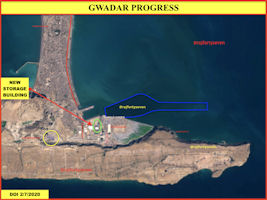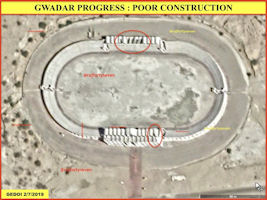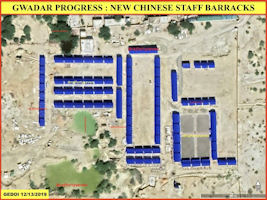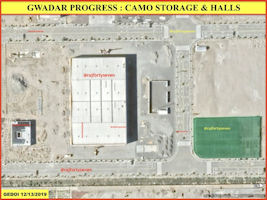Gwadar Port - Development
 China is building an ambitious $ 62 billion industrial and road netweork from western China to a strategic naval port located at Gwadar in Pakistanís western state Sindh, close to Persian Gulf. India has consistently objected to Chinese investment in disputed region of Jammu & Kashmir and even snubbed Chinese overtures to join its one belt one road initiative.
China is building an ambitious $ 62 billion industrial and road netweork from western China to a strategic naval port located at Gwadar in Pakistanís western state Sindh, close to Persian Gulf. India has consistently objected to Chinese investment in disputed region of Jammu & Kashmir and even snubbed Chinese overtures to join its one belt one road initiative.
Both Karachi and PQA were considered for such development but were found unattractive to major shipping lines due to the remoteness from the main shipping routes, the limitations of draft for mother ships and large bulk oil carriers and the comparative long turn around times. The ADB studies, however considered Gwadar to have the most advantageous location for such an alternative port in the region, which could handle mother ships and large oil tankers in due course.
Keeping that aspect in view as well as the inherent strategic and economic benefits that Gwadar Port offered, the transport plan of the 8th Five Year Plan (1993-94) of Pakistan included the development of Gwadar Port as an essential element of its aims and objectives. Technical and financial feasibilities therefore were under taken resulting in decisions for the development of Gwadar Port by the Govt. of Pakistan.
The Project started on 22 March 2002, and was on fast track completed in scheduled time in March 2005. With initiative and calculated risk, the Port received merchant ships since January 2003 and had been able to off load hundreds of tones of cargo imported for the Project, thus saving precious time and money which otherwise is required for transportation of the same cargo by road from Karachi/PQA to Gwadar.
Phase II of the project involved construction of more berths on BOT basis including two container berths, one bulk cargo terminal, one grain terminal with capacity handling vessels up to 100,000 DWT, one roll on/ roll off terminal, two oil piers for vessels up to 200,000 DWT and future expansion of two container berths. On completion of the project, Gwadar Deep-sea port would be on of the world's most strategically located port in this part of the world.
Total amount equivalent to Rs 14.9 Billion (248 million US dollars) were approved by ECNEC for Phase-I of the project. The financial agreement for development of Phase-I was signed with the Govt. of China on 10 August 2001 under which the Chinese would provide US$. 198 Million and the Govt. of Pakistan would provide US$. 50 Million.
On 20 March 2007 President Gen Pervez Musharraf officially opened, along with Chinese Minister of Communications Li Shenglin, the countryís third port at Gwadar and promised a fourth port to be built at Sonmiani in the Lasbela district. Once completed, the Gwadar port would rank among the world's largest deep-sea ports. The Gwadar port project would transform Pakistan's Navy into a force that can rival regional navies. The government of Pakistan has designated the port area as a "sensitive defense zone." The Gwadar port would rank among the world's largest deep-sea ports. The port provides China a strategic foothold in the Arabian Sea and the Indian Ocean.
In December 2007 the Government of Pakistan approved a plan to establish two new large sized shipyards at Gwadar in Balochistan Province ("Gwadar Shipyard") and Port Qasim near Karachi in Sindh Province ("Qasim Shipyard") on a fast track basis. The Gwadar Shipyard is planned to be established at Gwadar East Bay (Shamba Ismail area), on an area of approximately 500 acres (2 sq. kilometers approx). Initially planned to carry out ship repairs, it shall lead to ship building of up to Very Large Crude Carrier (VLCC) and Ultra large Crude Carrier (ULCC) size and would have at least two dry docks of approximately 600,000 DWT.
On 01 October 2008 Prime Minister Syed Yousuf Raza Gilani constituted a committee under the chairmanship of Minister for Ports and Shipping Qamar Zaman Kaira to finalise the sites for building shipyards at Karachi and Gwadar. Gilani expressed the government's resolve for the development of shipbuilding industry in the country, saying that setting up of two shipyards in Karachi and Gwadar would go a long way in catering to domestic as well as international needs. He stressed the need for making Pakistan a leading shipbuilding country of the region, thus contributing towards economic development and poverty alleviation. Two world class shipyards on joint venture basis were proposed to be built at Gwadar and Port Qasim. These projects would attract major investment from foreign sources.
Pakistan announced 07 May 2011 that China had agreed to its request to take over operations at a major port, while hoping that Beijing can also help build a naval base there. "The Chinese government has acceded to Pakistan's request to take over operations at Gwadar port as soon as the terms of agreement with the Singapore Port Authority (SPA) expire," Associated Press of Pakistan (APP) quoted Defense Minister Chaudhry Ahmad Mukhtar as saying in a statement. According to APP, Mukhtar said Pakistan appreciated that the Chinese government agrees to run the port, but would be more grateful "if a naval base is constructed at the site of Gwadar for Pakistan." Gwadar has been run as a commercial port under the current deal between Pakistan and Singapore Port Authority (SPA). India's Defense Minister A.K. Antony last week voiced "serious concern" toward so-called growing defense ties between China and Pakistan and said New Delhi's only answer was to strengthen its military capabilities.
Pakistan's Cabinet gave nod Oct 05, 2018 to the signing of a memorandum of understanding with Saudi Arabia to set up a state-of-the-art oil refinery in the southwestern province of Balochistan. The proposed 500,000-barrel per day refinery is estimated to be completed with an investment of about 8 to 9 billion US dollars. The refinery will be set up at Gwadar, a coastal town on the Arabian Sea where China built a deep seaport under the China-Pakistan Economic Corridor. The Cabinet meeting was presided by Prime Minister Imran Khan. Petroleum Minister Ghulam Sarwar Khan briefed the Cabinet about a Saudi Arabia delegation which had visited Pakistan to explore investment opportunities.
Calling Pakistan an ďall-weather friendĒ, official Chinese media reported that Beijing planned to step up its military cooperation with Islamabad to produce ballistic missiles, cruise missiles and a multi-role combat aircraft. The reports came 17 March 2017 amid Pakistanís new army chief holding talks with top Chinese officials. On his first visit to China after he took over as Pakistanís army chief, General Qamar Javed Bajwa yesterday held talks with General Fang Fenghui, chief of the Joint Staff Department under the Central Military Commission.
The two sides vowed to ensure the safety of the China-Pakistan Economic Corridor (CPEC), an important part of Chinaís One Belt and One Road initiative. Masood Khalid, Pakistanís Ambassador to China, told the news conference that Pakistan has deployed more than 15,000 troops to protect the CPEC and the countryís navy has raised a special contingent for the protection of Gwadar Port.
|
NEWSLETTER
|
| Join the GlobalSecurity.org mailing list |
|
|
|





